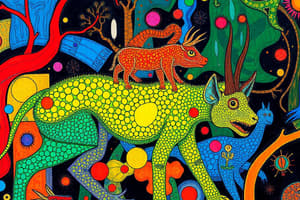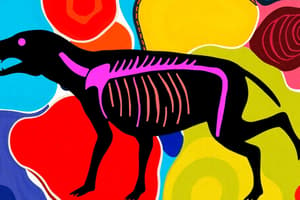Podcast
Questions and Answers
How did Medieval Christian thought position animals in relation to humans?
How did Medieval Christian thought position animals in relation to humans?
Animals were fundamentally considered lower in status than humans due to their nature.
What concept influenced the perception of nature and animals in Medieval Christianity?
What concept influenced the perception of nature and animals in Medieval Christianity?
The concept of original sin influenced the perception, suggesting that all of nature, including animals, is corrupted.
What was Thomas Aquinas' position on the relationship between humans and animals?
What was Thomas Aquinas' position on the relationship between humans and animals?
Thomas Aquinas believed in the subordination of animals to humans based on their different types of souls.
What unique event occurred in the town of Glurns in 1519 regarding animals?
What unique event occurred in the town of Glurns in 1519 regarding animals?
What theological problem arose after the Middle Ages regarding animal suffering?
What theological problem arose after the Middle Ages regarding animal suffering?
What was the role of vegetarianism in medieval thought regarding the killing of animals?
What was the role of vegetarianism in medieval thought regarding the killing of animals?
How did the hierarchical view (scala naturae) influence the understanding of animals in Christian medieval society?
How did the hierarchical view (scala naturae) influence the understanding of animals in Christian medieval society?
What underlying issue related to animals is present in Christian doctrine as reflected in the medieval context?
What underlying issue related to animals is present in Christian doctrine as reflected in the medieval context?
What right is guaranteed by Art 12 of the Federal Constitution?
What right is guaranteed by Art 12 of the Federal Constitution?
According to Adam Smith, what constitutes necessaries for living?
According to Adam Smith, what constitutes necessaries for living?
Why is the prohibition of torture considered non-negotiable in the context of human dignity?
Why is the prohibition of torture considered non-negotiable in the context of human dignity?
How does the Kantian categorical imperative relate to human rights?
How does the Kantian categorical imperative relate to human rights?
What distinction is made between the dignity of embryos and persons?
What distinction is made between the dignity of embryos and persons?
What is meant by the term 'dignity prime' when discussing embryos?
What is meant by the term 'dignity prime' when discussing embryos?
How is the concept of animal dignity defined in relation to human interests?
How is the concept of animal dignity defined in relation to human interests?
What is the classical notion of human dignity?
What is the classical notion of human dignity?
What implications does the balancing of values have on ethical considerations of dignity?
What implications does the balancing of values have on ethical considerations of dignity?
How does the dignity of animals differ from that of humans according to the text?
How does the dignity of animals differ from that of humans according to the text?
What are some challenges in defining the anthropological difference?
What are some challenges in defining the anthropological difference?
What is the 'paradox of the anthropological difference'?
What is the 'paradox of the anthropological difference'?
What solution does the text propose regarding potentiality in relation to human embryos?
What solution does the text propose regarding potentiality in relation to human embryos?
What property is used to support the moral status of typical humans over typical chimpanzees?
What property is used to support the moral status of typical humans over typical chimpanzees?
Why is the placement of moral status limits controversial?
Why is the placement of moral status limits controversial?
What are the three proposed solutions to the paradox of the anthropological difference?
What are the three proposed solutions to the paradox of the anthropological difference?
According to a consequentialist perspective, why is it reasonable to support the intrinsic value of animals?
According to a consequentialist perspective, why is it reasonable to support the intrinsic value of animals?
What distinguishes the dignity of animals from that of human embryos in the discussed perspective?
What distinguishes the dignity of animals from that of human embryos in the discussed perspective?
What is genomic essentialism, and why is it criticized?
What is genomic essentialism, and why is it criticized?
What ethical stance is implied by assigning dignity to all living organisms, including those without sentience?
What ethical stance is implied by assigning dignity to all living organisms, including those without sentience?
How does the introduction of creationist language into the Constitution affect the concept of dignity in living beings?
How does the introduction of creationist language into the Constitution affect the concept of dignity in living beings?
What is the risk associated with the inflationary concept of dignity as described in the content?
What is the risk associated with the inflationary concept of dignity as described in the content?
Why might some views on dignity be considered more of a belief than a philosophical thesis?
Why might some views on dignity be considered more of a belief than a philosophical thesis?
What concerns arise from the passage's mention of fundamentalist conceptions of animal dignity?
What concerns arise from the passage's mention of fundamentalist conceptions of animal dignity?
What is the main focus of Philippe Bugnon's work?
What is the main focus of Philippe Bugnon's work?
Name two domains of research where animal experimentation is performed according to the document.
Name two domains of research where animal experimentation is performed according to the document.
What is a common criticism of animal experiments stated in the document?
What is a common criticism of animal experiments stated in the document?
What is the role of the Institute for Laboratory Animal Science?
What is the role of the Institute for Laboratory Animal Science?
Who leads the education efforts in laboratory animal science at the University of Zürich?
Who leads the education efforts in laboratory animal science at the University of Zürich?
What year did the popular initiative regarding animal experiments take place in Switzerland?
What year did the popular initiative regarding animal experiments take place in Switzerland?
What types of species are involved in the animal experimentation mentioned?
What types of species are involved in the animal experimentation mentioned?
Who is Dr. Philippe Bugnon?
Who is Dr. Philippe Bugnon?
Flashcards are hidden until you start studying
Study Notes
The Hierarchy of Beings
- The Medieval Christian system of hierarchy (Scala Naturae) placed spiritual beings (Angels) above Humans, Humans above Animals, Plants, and Minerals
- Animals were seen as lower than humans and even affected by original sin
The Trial of the Voles
- A trial against voles was held in Glurns, a small Tyrolean town in 1519
- Judge Conradin von Spergser filed the lawsuit against voles due to their destructive behavior
- The legal action was brought because of the lack of other options to deal with the vole problem
- After an investigation, voles were deemed innocent by nature but were ordered to leave the area
- Due to the high number of vole offspring, a 14 day delay was granted before they were expected to migrate
Cartesian Modernity and Animal Suffering
- In the post-Medieval era, the idea of animals sharing in original sin lost its plausibility
- The suffering of animals, created by a just God, became a new theological problem
Animal Ethics and the Anthropocentric Difference
- Animal Ethics challenges the idea of a clear division between Humans and Animals
- It raises the question of classifying the upper and lower limits of what classifies as "human" – Homo sapiens, apes, mammals etc.
- The question of the moral status of living beings, and their "dignity" arises
- This challenges the traditional understanding of human dignity, which is seen as having no price
The Paradox of the Anthropological Difference
- Humans with diminished intellectual capacity, such as embryos, severely disabled individuals, or those in a comatose state, pose a challenge to the idea of a clear distinction between humans and animals
- If moral status is based simply on "rational" properties, then there will always be animals above and humans below the line of distinction in terms of moral status
Three Potential Solutions to the Paradox
- Potentiality: Human embryos have the potential to become a person, while a chimpanzee embryo does not
- Typical Species Properties: The average human is smarter than the average chimpanzee
- Article 12, Federal Constitution: Anyone unable to support themselves has a right to help and assistance for a life in accordance with human dignity
Adam Smith and Dignity
- Enlightenment philosopher, Adam Smith, defines "necessities" as not just essentials for life, but everything deemed socially acceptable for even the lowest strata of society
- This introduces the idea of social norms influencing what is deemed necessary for human dignity
Two Concepts of Dignity
- Non-negotiable Dignity: The absolute and non-negotiable value of human beings
- Dignity Prime: A more nuanced concept of dignity that allows for a weighting of values depending on the context and circumstances
Dignity of Animals
- The concept of dignity of animals is interpreted in terms of "dignity prime"
- Animals have intrinsic value but can be balanced with human interests, like food, medical research etc.
- This concept is grounded in the empirical fact of animal sentience
- Fundamentalist conceptions of animal dignity, based on "intact" genomes, are refuted by philosophy of biology
Würde der Kreatur (Dignity of Creatures)
- This extends the concept of dignity beyond sentient beings, to all living organisms
- This requires adhering to a biocentric ethic, which can lead to extreme positions (deep ecology)
- In its milder forms, it is more of a belief system than a philosophical thesis
- The introduction of creationist language into the Constitution of a modern state raises concerns about the justification and validity of such a concept
Dignity: An Inflationist Concept
- The concept of dignity has a great deal of rhetorical power
- This is because of its positive associations and historical significance with securing human rights
- overuse risks diluting its meaning and compromising legitimacy
Animal Experimentation in Switzerland
- Animal experimentation is performed in various research domains (Neurobiology, pharmaceuticals, behaviour etc.)
- The Popular Initiative in Switzerland in 2018-19 highlights concerns about the ethics of animal experimentation
Studying That Suits You
Use AI to generate personalized quizzes and flashcards to suit your learning preferences.




